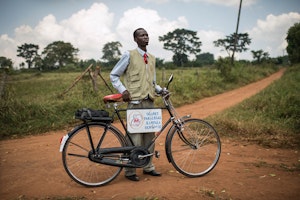Five Legal Strategies that Preserve the Rights of Women Living with HIV
By Melanie Croce-Galis

Sharon, a recently widowed Ugandan woman was in the hospital when she learned that her in-laws had sold off her land and taken much of her property.
In Uganda, a woman living with HIV like Sharon (a pseudonym) faces consistent widespread stigma. As a result, Sharon’s in-laws assumed they could get away with taking what they viewed as their son’s property. “Property grabbing” like this is a common occurrence, despite being prosecutable under the civil code. In the absence of her husband’s will to prove her ownership, Sharon could not reclaim her land or property when she returned from the hospital.
What did Sharon do?
She turned to a legal organization called the Uganda Network on Law, Ethics, and HIV/AIDS, or UGANET, which provides legal aid as a way to promote human rights and an ethical response to HIV and AIDS. UGANET filed a civil suit in Sharon’s case and the buyer agreed to an out-of-court settlement where his money was returned and Sharon got her land back.
This kind of settlement shows that creating space for negotiation can confront the discrimination that hounds people living with HIV, and that women’s access to legal services drives a strategy for addressing the impact of HIV.
Without legal strategies to protect women’s inheritance or property, women can be kicked out of their home upon the death of their spouse, and the resulting financial hardship and lack of resources can make women less able to seek or continue treatment, or to protect themselves in relationships.
UGANET is not alone in employing successful legal strategies to promote justice for women living with HIV. With my project, What Works For Women & Girls, we recently reviewed the wide-ranging literature on successful strategies and found five key features. They are:
- Law reform
Advocacy and activism to change underlying gender imbalances that prevent women from realizing their rights. - Strategic litigation
Taking carefully selected cases to court can set critical legal precedents to bring about social, political, and legal change. - Engagement with multiple legal structures
The traditional legal systems in many countries—where certain laws apply in the public domain and customary/religious laws apply in the private domain—can complicate women’s rights. Promoting equality for women and children among local, traditional, and community leaders can improve women’s ability to obtain justice. This requires removing financial, geographic, and other barriers to services. - Human rights education and legal empowerment programs
Advocacy, awareness raising, and training for women to know their rights are critical to reverse generations of prejudice. - International and regional human rights advocacy
Regional and international human rights advocacy can complement domestic advocacy. It can bring outside pressure and demonstrate global political will that resonate in corridors of power.
For Sharon, help from UGANET meant the difference between healing and homelessness. Women across the world need advocates to pay careful attention to the legal strategies that can advance their human rights and access to justice. And the world’s HIV response demands it too.
What Works Association is a grantee of the Open Society Foundations.
Melanie Croce-Galis is the executive director of the What Works Association.

